

Проект «Голоса еврейских местечек. Могилевская область».פיתוח קשרי התרבות בין העמים של ישראל ובלרוס
|
|---|
Поиск по сайту |
|
MainNew publicationsContactsSite mapVitebsk regionMogilev regionMinsk regionAlexander Barshai
|
Alexander BarshaiTHE USUAL HOLOCAUSTNeonila Lvovna Tsyganok is a teacher of history at a school in Osipovichi. In recent years she, together with her students, has been doing research on the Holocaust in Osipovichi. She visited a village called Svisloch, located in the region, and talked to the people that witnessed the Holocaust.THE STORY OF GEORGY ZABAVSKY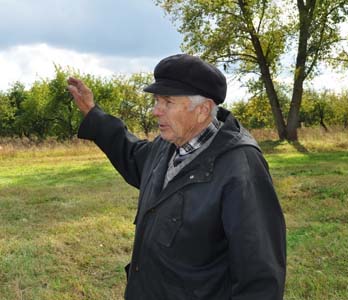 Georgy Timofeyevich Zabavsky, 2009.
Georgy Timofeyevich Zabavsky, 2009.
I was born in Svisloch on April 13, 1930 and have lived here my whole life. About three quarters of the population was Jewish before the war. The total population was less than a thousand. There were about 600 or 700 Jews. After the war began, Jews remained living in their houses. They were not made to move anywhere but were forced to attach yellow tabs to the back and front of their clothes. 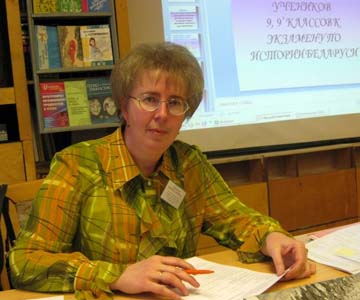 Neonila Lvovna Tsyganok.
Neonila Lvovna Tsyganok.
One of the residents, Aron, was hiding near the bridge across the Svisloch but Nazis found him. Aron was shot right there. I actually lost track of the time and all the murders. Nazi policemen were hiding from the partisans in our village. I remember that during the mass execution one of them was standing not far from our house, guarding the place. His brother was later boasting that he had murdered two Jewish women and thrown them into the lake. Men were executed separately in summer (most probably in August). They were buried in an orchard of the local collective farm. The victims had to prepare their own graves. Not fewer than 40 men were killed there. The execution of the remaining Jewish population took place perhaps at the end of August or beginning of September. The execution was carried out by Germans and Nazi policemen. Some of the people survived. Tsilia Rubinchik and the wife of Piotr Barshai were among them. After the war a memorial was set up at the execution site (between 1949 and 1951). Nothing is left now from the memorial, while the remnants of the bodies were re-buried in Bobruisk. 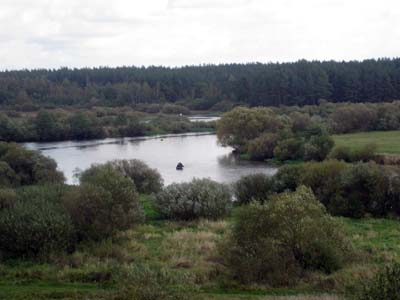 The river Svisloch.
The river Svisloch.
THE STORY OF BELLA BARSHAI-ARONOVA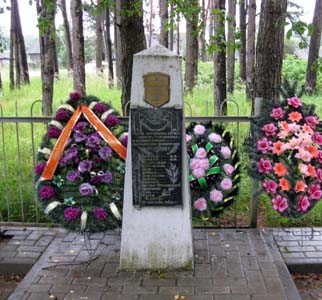 Memorial in Yelizovo.
Memorial in Yelizovo.
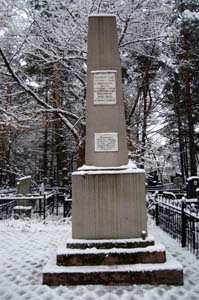 Memorial at
Memorial atthe Jewish cemetery in Bobruisk. Here the bodies of the Jews from Svisloch were reburied. Before the war our family moved from Svisloch to Yelizovo, where my father worked as a guard at a glass factory. However, many of our relatives remained in Svisloch. For us the war started on June 26, when German troops invaded the town. The punitive force arrived after them. They immediately shot more than a hundred men from Yelizovo of different nationalities in revenge for one killed fascist. Then they began «dealing» with the Jews. We had to move to the ghetto and were forced to do hard work. Once my 13-year-old brother Isaak went to work instead of me. Nazis caught him and several other adults to send them to a concentration camp. Brother was shouting that he was not even 14 and tried to take out his birth certificate out of his pocket but a Nazi policeman hit him on the head and threw him into the car. We have not seen him after that… A week after losing my brother I decided to visit my grandmother in Svisloch. It was October 14, 1941. I will never forget this date. Mother begged me not to go there but I ignored it and ran off. I crossed the bridge and realized I was in hell. Policemen were taking all the Jews to the woods in trucks. From there I could hear people crying and shrieking. It seems I was hypnotized. I kept walking and did not attempt running or hiding, even though around me there were a lot of policemen. I was looking at what was going on and kept repeating to myself: «I want to live, I will live, I have to live, I will survive this.» And then I reached my grandmother's house, unnoticed. She was at home lying in her bed. She was sick and was not planning to leave the house. She was crying and saying it was all over. She then kissed me and told me to leave as soon as possible. Then we were told that she had been shot in her bed. I tried to return to Yelizovo but was stopped on the bridge. Nazis blocked my way and shouted: «Turn back, Jew! Or we will kill you!» I told them I was from Yelizovo but in vain. I had to return and walk around Svisloch for several more hours. When it got dark I managed to walk across the bridge. However, when I was on the bridge, a truck with policemen, which was passing by, stopped near me. The policemen were all drunk – they had been celebrating the execution. One of them suggested shooting me. Another said: «It's ok. I know her. She is ours, from Yelizovo. Their turn will come soon.» Still, one of the policemen shot at me and missed… Before that someone informed my mother that I had been murdered and they had seen me lying on the bridge. (it was some other girl, who had been shot the day before). Mother dashed towards Svisloch but, fortunately, our neighbors stopped her. They convinced her it was a mistake and I would come back. You can imagine what all of us felt when I came back. Then a lot of things happened. There were pogroms and murders in Yelizovo, death of my father Iosif Barshai. My mother, brother and I escaped across the Berezina River and wandered in the woods for a long time until we found the partisans… Photos made by the author and N. Tsyganok. |
|||
|
|
Jewish settlements in Mogilev regionMogilev• Antonovka• Batsevichi• Belynichi• Belynkovichi• Bobruisk• Byhov• Chausy• Cherikov• Dashkovka• Dribin• Esmony• Glusk• Golovchin• Gorki• Gory• Grozdianka• Hotimsk• Kirovsk• Klichev• Konohovka• Kostukovichi• Krichev• Krucha• Krugloye• Lenino• Lubonichi• Martinovka• Moliatichi• Mstislavl• Naprasnovka• Osipovichi• Rodnia• Rudkovschina• Samotevichi• Sapezhinka• Selets• Shamovo• Shepelevichi• Shklov• Slavgorod• Staroselie• Sukhari• Svisloch• Vereschaki• Zaverezhie• Zhilichi• |
Main |
New publications |
Contacts |
Site map |
Vitebsk region |
Mogilev region |
Minsk region |